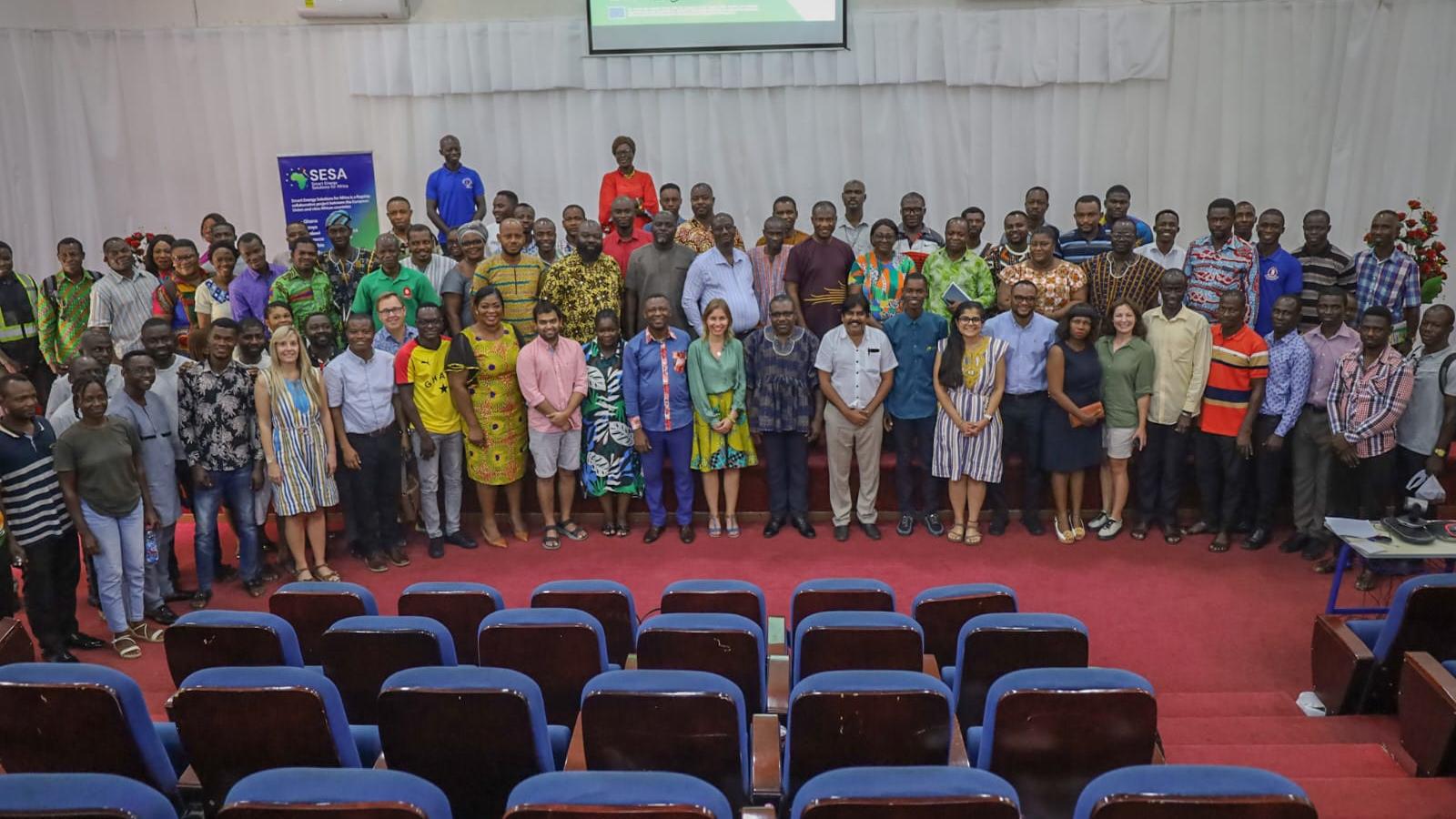Implementing Sustainable Energy Solutions: Takeaways from our exchange with the SESA Project in Ghana
Explore how Urbanshift Peer-to-Peer Exchange in Ghana promoted collaboration and showcased innovative solutions in waste-to-energy, clean cooking, and micro-grids to foster sustainable urban development.
Participants in the Peer to Peer Exchange in Ghana
The recent Urbanshift Peer-to-Peer Exchange, held from October 10th to 13th, brought cities together to share knowledge and further understanding around how clean energy solutions can support sustainability goals. During this event, representatives from the cities of Pune (India) and Alba Iulia (Romania) gathered in Ghana to meet with officials from Kumasi and Accra, Ghana. In partnership with the Smart Energy Solutions in Africa (SESA) project, the event brought together city officials, experts from urban development and research institutions such as the Akenten Appiah-Menka University of Skills Training and Entrepreneurial Development (AAMUSTED) and TU Berlin (TUB), as well as entrepreneurs from small and medium-sized enterprises (SMEs). The primary focus of this exchange was learning about the cooperation between municipalities, national government, research institutes and local SMEs in Ghana.
Transforming Communities: Safisana’s Waste-to-Energy Success Story
On the first day, city representatives visited Safisana, the first ever built waste-to-energy power plant in West Africa. It is situated in Ashaiman, in greater Accra, where 90% of the population lives below the poverty line. In Ashaiman, this plant has made a significant impact, simultaneously reducing organic waste and providing affordable, locally produced energy. It generates 600MwH of renewable clean energy and produces 286,000 tons of organic fertilizer annually by processing over 13,000 tons of organic and fecal waste. Not only does this facility assist local markets in waste disposal, but it also collaborates with local municipalities, providing public toilets and creating job opportunities around the power plant. Through a guided tour through the facilities, participants could witness firsthand the positive outcomes of a well-organized partnership between the private and public sectors for projects that put the idea of circular economy into practice. Safisana, in particular, is a collaboration between the Dutch Holding Safisana and the national waste collection company, funded and supported by the World Bank.
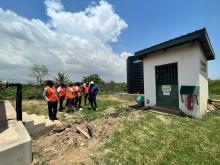
Living Labs: Testing Technologies for Clean Energy and Community Empowerment
SESA has been establishing Living Labs in Ghanaian cities, collaborating with Econexus and NASTECH, two local SMEs. These Labs serve as testing grounds for innovative ideas, technologies, and policies, aiming to find effective solutions for sustainable energy transitions. One major issue these Labs are tackling is the prevalent use of firewood and charcoal for cooking, which poses both environmental and health risks. In Ghana more than 10.000 deaths each year are directly linked to Household Air Pollution. Econexus developed stoves powered by climate-neutral Bioethanol, successfully implementing them in schools to initiate practical energy transition in people's lives. Another initiative, with NASTECH, explores options for second lives for batteries. By combining these batteries, which have completed their initial automotive life, with renewable energy sources in stationary systems, they create micro-grids supplying local networks with eco-friendly energy. In Bedaabour, a peri-urban community near Kumasi, this technology has significantly improved the lives of residents. A stable energy supply enables students to study at home and in the evenings, improves accessibility and connectivity by being able to charge phones at home as well as fostering community events which lead to enhancing social and economic prospects. These changes were made possible through renewable energy and empowered local communities, all achieved through strategic collaboration with SMEs. The City of Pune, India is inspired to explore similar collaborations with local SMEs on second-life batteries.
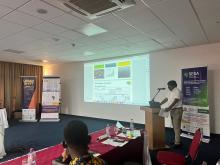
Lessons on collaboration with SMEs, cross-sectoral agencies and levels of government
The visits were accompanied by a policy dialogue and a deep dive on technologies with stakeholders and partners in Ghana and internationally. Local governments shared their experiences and challenges, while SMEs outlined what kind of governmental support they need to tailor initiatives and clean technologies for the local contexts. These examples highlight that small and medium-sized enterprises can provide excellent solutions for changing people's lives sustainably. According to the World Bank, 90% of all companies are SMEs and they provide 50% of all employees worldwide, forming the backbone of the global economy. Simultaneously, the global Corona pandemic has posed existential challenges for many of these businesses. Therefore, it is essential to support these companies, especially the ones that contribute to the Sustainable Development Goals (SDGs) and Nationally Determined Contributions (NDCs).
On the last day, we had the opportunity to talk about best practices in monitoring and evaluation of projects. In Ghana, the national government supports monitoring projects that they fund, which increases the capacity of cities to be able to deliver multiple projects at the same time. To add a touch of enjoyment to these intense four days, the organizers provided their guests with Ghanaian hospitality and cultural specialties such as dances and delicious, albeit spicy, cuisine.
This peer to peer exchange has been jointly funded and supported by the Global Environment Facility (GEF) as the funder of UrbanShift, and the European Commission (EC) as the funder of the SESA project.
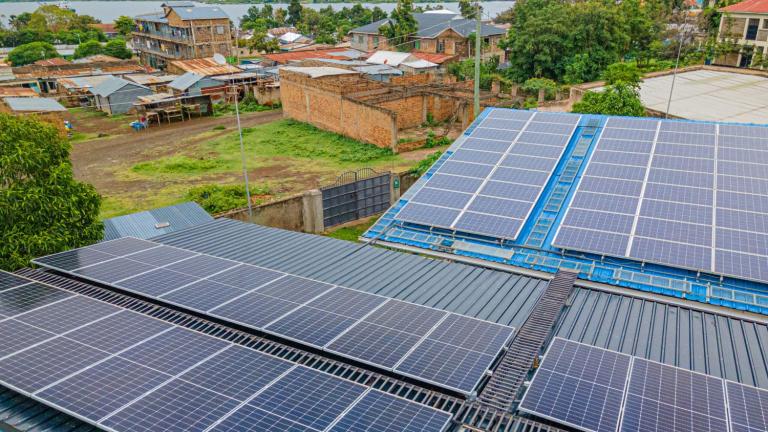
UrbanShift Global Peer Exchange on Sustainable Energy Solutions
This peer-to-peer exchange will bring UrbanShift city Pune, India to Ghana to learn about clean cooking, micro grids and waste-to-energy models.
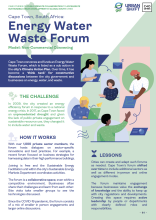
Cape Town, South Africa: Energy Water Waste Forum
Model: Non-Commercial Convening
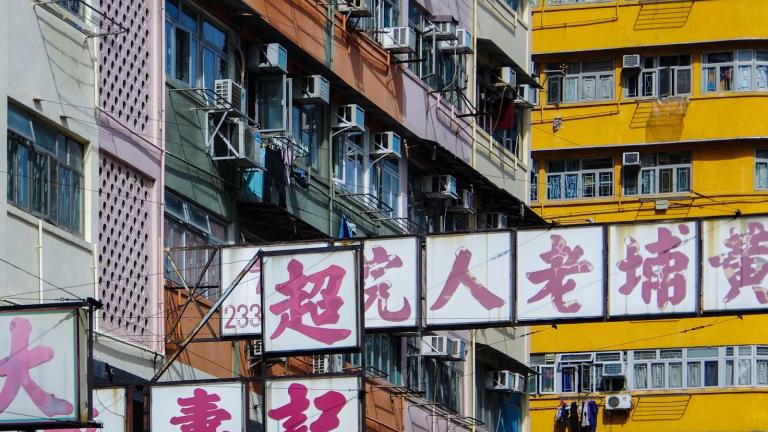
Strategies for efficiency in urban cooling: A focus on Asia and beyond
Asia's urban areas have experienced a dramatic increase in electricity consumption, especially for cooling systems. To address this issue, we gathered regional experts to explore energy-efficient urban planning and building design strategies.

Second National-Local Dialogue for Morocco: From Vision to Local Action, Advancing the Circular Economy
Building on the first National-Local Dialogue, this convening offered an opportunity to deepen discussions around localizing circular economy principles across the country.
